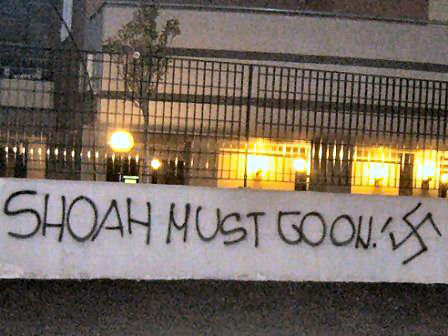A new survey published by the European Union Agency for Fundamental Rights reveals the worrying extent of anti-Jewish abuse in Europe
A new survey published by the European Union Agency for Fundamental Rights reveals the worrying extent of anti-Jewish abuse in Europe and failure of states to tackle this growing problem. There is now little room for doubt; Europe’s Jews feel increasingly threatened and abused, fearing antisemitic abuse from Muslim extremists, the extreme right-wing, and left-wing radicals. With few European member states taking any serious action, and the failure of the authorities to tackle this growing problem, the human rights of Jewish Europeans are under threat. 75 years after Kristallnacht, has Europe failed to learn from history?

This week marks the 75th anniversary of Kristallnacht, the series of coordinated attacks against Jews throughout Germany and parts of Austria which was the ominous prelude to the mass murder of much of European Jewry. The savage attacks of 9th November 1938 saw Jewish businesses attacked, hundreds of synagogues torched and around 30,000 Jewish men rounded up for deportation to concentration camps. German Chancellor Angela Merkel this week described Kristallnacht as “one of the darkest moments in German history,” urging “all the people in this country to show their civil courage and ensure that no form of anti-Semitism is tolerated.” But 75 years on, where do German Jews stand? Merkel herself went on to observe that today it is “almost inexplicable but also the reality that no Jewish institution can be left without police protection.”
This is true elsewhere in Europe, too. In Britain, I am used to attending synagogues protected by concrete crash barriers, watched over by teams of security guards. Our Jewish schools are surrounded with razor wire, and bomb proof doors. One security professional told me that this has become so normal most of the children don’t even notice it any more. Yet I grew up in a country that gave me, and generations of Jews before me, a safe place to live, study and pray. As a Rabbi friend of mine often publicly remarks at events of national importance, Britain has been good to its Jews, and the Jews have been good for Britain.
Yet over recent years, things have changed for the worse in Europe. Antisemitism has appeared in the lives of a generation who never thought they would experience it first hand. From stories about verbal abuse shouted at kippah-wearers and physical attacks on Jews, to an arson attack on a London synagogue and a shooting at a French Jewish school, it is clear that something has changed.
Jews across Europe are learning that antisemitism respects neither national nor ideological boundaries. Islamic antisemitism is proudly displayed on the streets of London and in Germany during the Iranian sponsored ‘Al Quds day’, with Hezbollah flags and Bashar al Assad banners held aloft. Chants of “Judenschweine” (Jewish pigs) rung out for all to hear at a German football match in Offenbach, only two months ago. The far right, the far left, the middle class intelligentsia and European Muslim communities all have within their ranks groups who not only hate Jews, but never seem to tire of finding new ways to express their hatred.
Despite the increasingly distressing amount of anecdotal evidence appearing in the news, it has been hard to gauge the extent of Europe’s antisemitism problem. Stories of individuals suffering antisemitic discrimination and even violence are, of course, unacceptable. But they cannot alone provide a clear picture of a trend. Some argue that ‘legitimate’ criticism of Israel is erroneously labeled as antisemitism (it rarely is). Academics and commentators are unable to agree what it all means. Manfred Gerstenfeld writes in his recent book, Demonizing Israel and the Jews, that
polls show that well over 100 million Europeans embrace a satanic view of the State of Israel… [this] view is obviously a new mutation of the diabolical beliefs about Jews which many held in the Middle Ages, and those more recently promoted by the Nazis and their allies.
But others warn that comparisons with German National Socialism of the early 20th century are alarmist and overblown. It is true that the cracks on German shop windows this week will be nothing more than stickers, applied as a part of a peculiar campaign of remembrance and solidarity with the murdered Jews of Kristallnacht. One British Jewish community leader once challenged me, asking, “surely you don’t think it’s as bad here as it was in Nazi Germany?”, as if Europe’s Jews ought to wait for a full-scale repeat of such extreme levels of Jew-hatred before we allow ourselves to say “enough.”
Antisemitism Is Still Shockingly Widespread
It is against this backdrop of reports of antisemitic attacks occurring across Europe, aggressive campaigns launched against Israel, and general academic disagreement over the true levels of European antisemitism, that the European Union Agency for Fundamental Rights (FRA) has just published the results of its survey of European antisemitism. Today, the FRA proudly released “the first comparable figures on Jewish people’s experiences of antisemitic harassment, discrimination and hate crime in the EU.” Published on the eve of the 75th anniversary of Kristallnacht, we finally have statistical data which shows what many have long known: that antisemitism is still shockingly widespread, and that Europe has failed to take action to prevent another alarming escalation in levels of hate crimes aimed at Jews.
The report covers responses from 5,847 Jewish people in the eight countries in which some 90% of the estimated Jewish population in the EU live, and should be a vital tool for EU decision makers and community groups who need urgently to address this unacceptable problem.
Until now, European policy makers have failed to act effectively enough to prevent or stop antisemitism from getting worse. This could either be because of a lack of firm evidence of the problem in the first place, or because of a lack of political motivation to do so. Today, only 13 EU member states even bother to collect official data on antisemitic incidents reported to the police or processed through the criminal justice system. The FRA’s survey now provides robust and comparable data on the situation, putting pressure on individual states and the EU as a whole to take action—they can no longer plausibly claim ignorance of the problem. There can be no doubt that inaction now would be through choice.
The results of the survey leave little room for doubt; Europe’s Jews feel increasingly threatened and abused. 66% of respondents consider antisemitism to be a major problem in their countries, and a staggering 76% said the situation had become more acute over the last five years. In the 12 months preceding the survey, 21% of all respondents personally experienced at least one antisemitic incident involving verbal insults, harassment or a physical attack. Worryingly, however, 76% of those victims did not report the most serious incident to the police or any other organization. These Jews not only suffered attacks, but also seem to have lacked faith in any organization’s ability to help or protect them. The decision makers and police forces of Europe must drastically increase their efforts to redress this damning indictment of their abilities to reassure and protect Jewish victims of hate crime.
Modern European Jews, like everyone else, face a variety of day to day challenges in their lives. Yet antisemitism is considered the fourth most-pressing social or political issue across the countries surveyed—even in 2013. As with other forms of bullying and abuse, the Internet has provided a new platform for racists: an overwhelming three-quarters of respondents consider online antisemitism to be a problem, indicating that there is an urgent need for more effective reporting and investigation of online racism against Jews. Recent cases, however, show sites such as Facebook refusing to act when Holocaust denial groups and other hate pages aimed at Jews are reported. European member state governments and the EU itself should become far more proactive in policing these outlets for racist abuse.

The results of the survey also call into question some of the rigidly held positions of the ever increasing number of organizations and pseudo-academic bodies studying antisemitism. Most notably, the idea that antisemitic attacks are mostly carried out by right-wing extremists, does not correlate with the responses of the victims of those attacks. Of those exposed to incidents of antisemitic violence, threats and harassment over the past five years, 27% of respondents reported that the most serious incident was perpetrated by someone with Muslim extremist views, 22% attributed it to someone with a left-wing political view, and 19% to someone with right-wing views.
It is not clear why so many organisations professing to deal with antisemitism have been working so hard to deny the main sources of this hate crime. The director of the Berlin International Centre for the Study of Antisemitism, Dr. Clemens Heni, seems to blame a politically correct “post-colonial and post-Orientalist ideology,” lamenting in a recent paper that “almost all scholars in the social sciences and humanities … reject or ignore research on Islamism and Muslim antisemitism.” Heni suggests that “the strange increase in research centers, consortiums, and events regarding antisemitism [indicates] a hijacking of serious scholarship by newcomers who have no interest in analyzing antisemitism.” The FRA’s data, however, clearly suggests at least as much attention needs to be paid to tackling Muslim antisemitism and left-wing antisemitism, as to the very real threat posed by far right antisemitism.
There is some level of regional variation, with different European cultures resulting in different manifestations of anitsemitism in different countries. For example, in the UK, 9% of respondents said they had often heard the statement “Jews are responsible for the current economic crisis,” while this figure rose to 59% in Hungary. The survey found that while in Latvia only 8% of respondents said the Israeli-Arab conflict had a large impact on how safe they felt, the figure rose to 28% for Germany, and was as high as 73% in France. Thus it is important that European nations act according to the actual needs and demands of their own populations, as well as joining in a wider continental effort to eradicate this pervasive hatred.
A Complex Syndrome
Antisemitism is no less complex a hatred today than it was 75 years ago. The Italian writer Fiamma Nirenstein warns in a recent article that
Not a single person admits to being anti-Semitic … Even the little girl who asked me if I had a tail back in elementary school didn’t actually know she was antisemitic; she asked out of curiosity … the true antisemitism that still exists in Europe is not recognised or understood.
Last week, the German public television station ARD broadcast a documentary about modern antisemitism in German society. The documentary focused in part on the anti-Israel actions and ideologies common to the otherwise apparently unrelated groups carrying out antisemitic acts in Germany. It effectively demonstrated that in Germany, as in much of Europe, anti-Israel discrimination is all too often the glue that binds together the antisemitsm of Islamists, the educated middle-class, those on the left, and extremist right-wingers. The FRA’s research backs this up with robust statistical evidence.

Furthermore, in the German film, Professor Monika Schwarz-Friesel, who has studied many examples of antisemitic letters and emails sent to Germans, points out that the vast majority of letters are not written by those belonging to extremist groups of the left or right, but by those in the “center of society.” Professor Andreas Zick of Bielefeld University, a specialist in prejudice research, warns that “antisemitism, even if it is only latent, remains a pioneer from words to deeds.” And startlingly, Jörg Ziercke, the President of Germany’s Federal Criminal Police Office, reported that “2 or 3 violent antisemitic attacks take place in Germany each day.”
75 years after Kristallnacht, Europe must wake up to the real and immediate problem of rising antisemitism which it has misunderstood and ignored for too long. The FRA’s important work in surveying European Jewry to uncover its first hand experiences of abuse and hate crime provides a clear signal of how much work needs to be done in this area. With the FRA’s robust statistics and suggested actions clearly and explicitly stated, there can no longer be any room for doubt that decisive action is needed. Those concerned with human rights and the protection of minorities should accept nothing less than a thorough and effective overhaul of how antisemitism is tackled. Europe has failed its Jews before in the most tragic of circumstances. It must not allow political correctness, modern technology and bogus anti-Israel action to facilitate renewed attacks on one of history’s most persecuted minorities. “Never again” must be more than a utopian wish: now is the time to for Europe to make it a promise.
Jonathan Sacerdoti is a political analyst, broadcaster and writer based in the UK.
To receive updates on new articles in English, join Mida on Facebook or Twitter.







what happened to the Jewish people in Nazi Germany was horrific. However, ever since then it has been used by Zionist to justify their treatment of the Palestinians. in fact the Holocaust has been used to gain the sympathies of Western Europe to support the atrocities the treatment of Palestinians so don't blame them if after a while the sob story doesn't wash. And most certainly don't start calling this antisematism